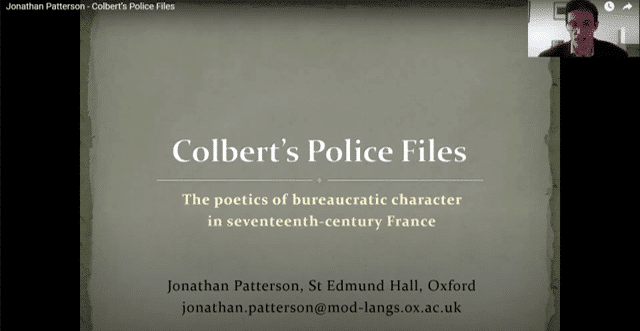Dr Jonathan Patterson
College Lecturer in French
Jonathan is a Departmental Lecturer in French. He teaches French language and literature, with a particular focus on the period of his research: the sixteenth and seventeenth centuries.
My research explores how literature interacts with broader cultural forces of early modern society: morality, law, bureaucracy, and economics.
My first book, Representing Avarice in Late Renaissance France (Oxford University Press, 2015), considers how talk of greed slowly evolved from past traditions to inform wider debates on gender, enrichment and status.
My second book is entitled Villainy in France, 1463-1610: A Transcultural Study of Law and Literature (Oxford University Press, 2021). This is a book about the harmful, outward manifestation of inner malice – villainy – in French culture. In pre-modern France, villainous offences were countered, if never fully contained, by intersecting legal and literary responses. Combining the methods of legal anthropology with literary and historical analysis, this study examines villainy across juridical documents, criminal records, and literary texts from the age of François Villon to the time of Pierre de L’Estoile. Villainy in France follows this overflowing current of pre-modern French culture, examining its impact within France and across the English Channel.
Four leading scholars discuss Villainy in France in the H-France Forum 2022. You can read their essays and my response essay:
https://h-france.net/h-france-forum-volume-17-2022
My current research interrogates the relationship of administration to literature in France before the advent of eighteenth-century caricatures of ‘bureaucratie’ (government by paperwork and petty clerks). It will offer a very different, ‘bottom-up’ view of administration – one that will demonstrate the idiosyncrasies of character in writings about and by administrative personnel, in two distinct segments of French history: c.1520-1550, and c.1650-1680. From case studies of these two periods, a nuanced vision emerges of writers ‘dans le maniement des affaires’.
Here is Jonathan’s keynote address, ‘Colbert’s Police Files: The poetics of Bureaucratic Character in Seventeenth-Century France’ at the online workshop, ‘Bureaucratic Poetics: Brian O’Nolan and the Irish Civil Service’, on 26 November 2020.

Jonathan is a Fellow of The Higher Education Academy. At Oxford he is a College Tutor in French and a Departmental Lecturer in the Sub-faculty of French. As well as translation classes, his college teaching covers the first-year course (sixteenth to twentieth centuries), and specialist courses (second-year upwards) in literature from the sixteenth to the eighteenth centuries. Recent undergraduate lectures on the early modern period have included series on voices and sounds, and money and status.
Jonathan supervises graduate studies, and welcomes enquiries in the following areas: literature, law, and history; comparative literature (French and English); early modern drama; history of the book.
Jonathan is also involved in outreach initiatives to schools and the wider public.
In 2017 he contributed to Oxford’s hugely popular Curiosity Carnival – hosting an interactive sideshow on Renaissance insults!
From 2016-18 he was a judge of the French Film Competition, and he has recently contributed to the UNIQ summer schools in French.
Interested in studying French at Oxford? See our Adventures on the Bookshelf – a treasure trove of useful information.
Monographs:
Villainy in France, 1463 – 1610: A Transcultural Study of Law and Literature (Oxford, Oxford University Press, in press). Contents:
- Introduction: Going with Villainy’s Flow
- Part 1: Villainy: What the Jurists Say (3 chapters)
- Part 2: A Poetry of Villains (3 chapters)
- Part 3: Remembering Rabelais: Tricksters and Trials (4 chapters)
- Part 4: Massacre and Villainy (4 chapters)
- Part 5: L’Estoile: Villainy Between Law and Literature (4 chapters)
- Afterword: Still going with Villainy’s Flow
Representing Avarice in Late Renaissance France (Oxford: Oxford University Press, 2015), 325 pp. Contents:
- Introduction: A Word History
- Chapter 1: Avarice and avares
- Chapter 2: Gender Battles
- Chapter 3: Grasping at Gold and Money
- Chapter 4: The ‘Fourth Estate’
- Chapter 5: Montaigne’s Avarice
- Chapter 6: Before and Beyond Molière
Journal articles:
‘“Greatness going off” in Renaissance Antony and Cleopatra Tragedies’, in The Relation of Literature and Learning to Social Hierarchy in Early Modern Europe, ed. by Neil Kenny (special volume for the Proceedings of the British Academy, forthcoming 2021)
‘Les fous, les idiots, et les gens de basse condition chez Guillaume Bouchet, lecteur de Huarte’, Bibliothèque d’humanisme et Renaissance, 80:2 (2018), 249-64
‘Obscenity and Censorship in the Reign of Henri III’, Renaissance Quarterly, 70:4 (2017), 1321-65
‘Variations of Vileness: An Introduction’, Early Modern French Studies, 39:2 (2017), 1-9
‘“Diables incarnez, Machiavelistes, Heretiques”: The Villains of Pierre Matthieu’s La Guisiade Reconsidered’, French Studies, 70, (2016), 1-16
‘“Viles personnes”: The Plebeian Multitudes in Charles Loyseau’s Traité des ordres’, The Seventeenth Century, 31:1 (2016), 71-94
‘Rabelais’s Uncommon Villains: A Reinterpretation of Quart Livre 45-7’, Etudes Rabelaisiennes, 54 (2015), 97-113
‘Life Writing in the Early Modern Period: The Case of Guillaume Colletet’s Vie de François Villon’, French Studies Bulletin, 36:134 (2015), 4-7
‘Unresolved Debates on Usury and Greed in Late Renaissance France: Guillaume Bouchet and Others’, Renaissance Studies, 28 (2014), 659-75
‘Avarice in the Moral Landscape of Olivier de Serres’s Theatre d’agriculture et mesnage des champs (1600)’, Forum for Modern Language Studies, 49 (2013), 244-56
‘Marie de Gournay, Poetry and Gender: In Search of “La vraye douceur”’, Seventeenth-Century French Studies, 32 (2010), 206-20
Book chapters:
‘Killing Coligny: Staging the Admiral’s Death, From the Place de Grève to the Rose Theatre’, in Last Scene of All: Representing Death on the Western Stage, ed. by Jessica Goodman (Legenda, forthcoming 2021)
‘Rabelais et son art textuaire: une lecture du Prologue du Quart Livre (1552)’, in the forthcoming Actes du colloque “Inextinguible Rabelais” (12-15 novembre, 2014) (Paris: Classiques Garnier, forthcoming, 2020)
‘Jean Brinon and His Cenacle: An Enduring Sodalitas?’, in Ingrid de Smet and Paul White (eds), Sodalitas Litteratorum: le compagnonnage littéraire néo-latin et français à la Renaissance. Etudes à la mémoire de Philip Ford (Geneva: Droz, 2019), pp. 85-100.
Books reviewed:
Richard Hillman, The Shakespearean Comic and Tragicomic: French Inflections (Manchester: Manchester University Press, 2020), in H-France Review. Forthcoming, 2021. Online.
Peter Frei, François Rabelais et le scandale de la modernité : pour une herméneutique de l’obscène renaissant (Geneva: Droz, 2015), in French Studies, 71 (2017), 104-5
Jacques Yver, Le Printemps d’Yver, ed. Marie-Ange Maignan (Geneva: Droz, 2015), in French Studies, 70 (2016), 99-100
Michael Meere (ed.), French Renaissance and Baroque Drama: Text, Performance, Theory, in H-France Review, 15 (October 2015), 1-5. Online.
Jotham Parsons, Making Money in Sixteenth-Century France: Currency, Culture, and the State (Ithaca and London: Cornell University Press, 2014), in French Studies, 69 (2015), 387
Educational Resources:
‘The Sheep-biter, The Villain, The Politique, and the Piglet’. Blogpost, The Oxford Centre for Research in the Humanities. Online.
‘Joachim Du Bellay, Défense et illustration de la langue française’, in The Literary Encyclopedia (2015), vol 1.5.2.02: French Writing and Culture in the Renaissance, 1500–1500, ed. by Tim Unwin, Phillip John Usher, and David Williams. Online.
Co-authored with Jonathan Rogers, ‘Thérèse Raquin by Emile Zola: Surgical Method in Psychiatry’, British Journal of Psychiatry, Jul. 2015, 207 (1) 36. Online.
DOI: 10.1192/bjp.bp.114.157982.
Where next?
French

